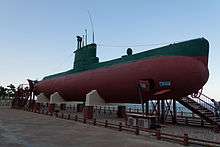Sang-O-class submarine
.jpg) Submarine involved in the 1996 incident as described. | |
| Class overview | |
|---|---|
| Builders: | Bong Dao Bo Shipyards, Singpo |
| Operators: |
|
| Preceded by: | Yugo class |
| Succeeded by: | Sinpo class |
| Subclasses: | attack version, infiltration/reconnaissance version |
| In commission: | 1991 |
| Completed: | 40+ |
| Active: | 40 (March 2011)[1] |
| Lost: | 1 captured by South Korea |
| General characteristics (Sang-O I armed version) | |
| Type: | coastal submarine |
| Displacement: | 275 tons (surfaced), 370 tons (submerged) |
| Length: | 34m |
| Beam: | 3.8m |
| Propulsion: | Diesel-electric: 1 small diesel, 1 electric motor, 1 shaft |
| Speed: |
|
| Range: | 1,500 nautical miles (2,800 km) |
| Test depth: | 150 metres, capable of bottoming |
| Capacity: | 0 (10/11 in recce version) |
| Complement: | 15 crew |
| Sensors and processing systems: |
|
| Armament: | |
| Notes: | Fitted with a snorkel |
The Sang-O class submarines are in use by North Korea, and are the country's largest indigenously-built submarines. A single unit was captured by the Republic of Korea Navy (South Korea) after it ran aground on 18 September 1996 in the 1996 Gangneung submarine infiltration incident.
Sang-O II / K-300

It was widely reported[2] in March 2011 that a new version of the Sang-O class had been deployed in North Korea. Satellite imagery from 2005 suggests the Sang-O II / K-300 may have been produced at the Mayang-do naval base and fitted out at the dry docks located at 39.9978 N, and 128.20019 E.[3] Other footage of the nearby docks of Sinp'o appear to depict the Sang-O II / K-300 as early as 2004 (at 40 01'31.20"N 128 09'55.80"E). Subsequent satellite imagery shows the Sang-O II / K-300 deployed to the Ch’aho-rodongjagu submarine Navy Base at 40.205441 N 128.649524 E on North Korea's east coast.[3]
According to the KPA Journal,[1] the decision to develop a larger, improved version of the Sang-O came in the late 1990s or early 2000. The Sang-O II / K-300 is a stretched version of the original Sang-O class with an approximate length of 39 to 40 metres and a corresponding surface displacement of approximately 300 to 340 tons. The increased length and internal volume would suggest an increased in the operational range of the submarine and troop/equipment carrying capabilities. Top speed is also reported to be higher in the new model, meaning an improved propulsion system is likely using some of the extra length.
References
- 1 2 "N.Korea Builds up Submarine Force" (PDF). The Chosun Ilbo. 21 March 2011.
- ↑ Joseph S. Bermudez Jr. (21 March 2011). "KPN deploys new version of Sang O class Coastal Submarine". KPA Journal.
- 1 2 "South Korea releases details of North Korea coastal submarine". 25 April 2011.